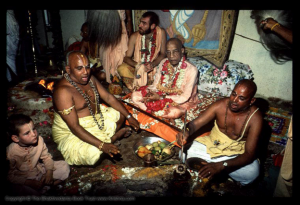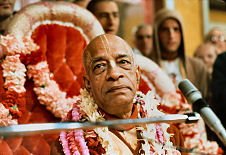![]()
(this file composed by Yasoda nandan prabhu)
Who and who not to associate with
We should befriend and offer special respect to persons who are developed in Kṛṣṇa consciousness. Other living entities are undoubtedly part and parcel of the Supreme Lord, but because their consciousness is still covered and not developed in Kṛṣṇa consciousness, we should renounce their association. It is said by Viśvanātha Cakravartī Ṭhākura that even if one is a Vaiṣṇava, if he is not of good character his company should be avoided, although he may be offered the respect of a Vaiṣṇava. Anyone who accepts Viṣṇu as the Supreme Personality of Godhead is accepted as a Vaiṣṇava, but a Vaiṣṇava is expected to develop all the good qualities of the demigods.
The exact meaning of the word sattvena is given by Śrīdhara Svāmī as being synonymous with dhairyeṇa, or patience. One must perform devotional service with great patience. One should not give up the execution of devotional service because one or two attempts have not been successful. One must continue. Śrī Rūpa Gosvāmī also confirms that one should be very enthusiastic and execute devotional service with patience and confidence. Patience is necessary for developing the confidence that “Kṛṣṇa will certainly accept me because I am engaging in devotional service.” One has only to execute service according to the rules and regulations to insure success Srimad-Bhagavatam : Canto 3: “The Status Quo” : SB 3.29: Explanation of Devotional Service by Lord Kapila : SB 3.29.16 : PURPORT
Śrīla Viśvanātha Cakravartī Ṭhākura advises that a Vaiṣṇava who is not of good character should be avoided. A Vaiṣṇava is one who has taken the Supreme Personality of Godhead as the ultimate goal of life, but if one is not pure and still has motives, then he is not a Vaiṣṇava of the first order of good character. One may offer his respects to such a Vaiṣṇava because he has accepted the Supreme Lord as the ultimate goal of life, but one should not keep company with a Vaiṣṇava who is in the mode of ignorance.Srimad-Bhagavatam : Canto 3: “The Status Quo” : SB 3.29: Explanation of Devotional Service by Lord Kapila : SB 3.29.8 : PURPORT
In Bhagavad-gītā there is reference to bodhayantaḥ parasparam, “discussing among themselves.” Generally pure devotees utilize their valuable time in chanting and discussing various activities of Lord Kṛṣṇa or Lord Caitanya amongst themselves. There are innumerable books, such as the purāṇas, Mahābhārata, Bhāgavatam, Bhagavad-gītā and Upaniṣads, which contain countless subjects for discussion among two devotees or more. Friendship should be cemented between persons with mutual interests and understanding. Such persons are said to be sva jāti, “of the same caste.” The devotee should avoid a person whose character is not fixed in the standard understanding; even though he may be a Vaiṣṇava, or a devotee of Kṛṣṇa, if his character is not correctly representative, then he should be avoided. One should steadily control the senses and the mind and strictly follow the rules and regulations, and he should make friendship with persons of the same standard. ooks : Srimad-Bhagavatam : Canto 3: “The Status Quo” : SB 3.29: Explanation of Devotional Service by Lord Kapila : SB 3.29.17 : PURPORT :
“… If one thinks that there are many pseudo devotees or nondevotees in the Kṛṣṇa Consciousness Society, one can keep direct company with the spiritual master, and if there is any doubt, one should consult the spiritual master…”
Books : Sri Caitanya-caritamrta – 1975 Edition : Cc. Madhya-lila : Madhya 19: Lord Sri Caitanya Mahaprabhu Instructs Srila Rupa Gosvami : Madhya 19.157 : PURPORT
“… It is also said, phalena paricīyate: one’s success or defeat in any activity is understood by its result. There are many karmīs in the dress of devotees, but the Supreme Personality of Godhead can detect their purpose. The karmīs want to use the property of the Lord for their selfish sense gratification, but a devotee endeavors to use the Lord’s property for God’s service. Therefore a devotee is always distinct from the karmīs, although the karmīs may dress like devotees. As confirmed in Bhagavad-gītā (3.9), yajñārthāt karmaṇo ’nyatra loko ’yaṁ karma-bandhanaḥ. One who works for Lord Viṣṇu is free from this material world, and after giving up his body he goes back home, back to Godhead. A karmī, however, although externally working like a devotee, is entangled in his nondevotional activity, and thus he suffers the tribulations of material existence. Thus from the results achieved by the karmīs and devotees, one can understand the presence of the Supreme Personality of Godhead, who acts differently for the karmīs and jñānīs than for the devotees
Books : Srimad-Bhagavatam : Canto 8: “Withdrawal of the Cosmic Creations” : SB 8.9: The Lord Incarnates as Mohini-Murti : SB 8.9.28 : PURPORT
An actual Vaiṣṇava is very pleased to accept another Vaiṣṇava who is bestowing the Lord’s mercy. A mundane person in the dress of a Vaiṣṇava should not be respected but rejected. This is enjoined in the śāstra (upekṣā). The word upekṣā means neglect. One should neglect an envious person. A preacher’s duty is to love the Supreme Personality of Godhead, make friendships with Vaiṣṇavas, show mercy to the innocent and reject or neglect those who are envious or jealous. There are many jealous people in the dress of Vaiṣṇavas in this Kṛṣṇa consciousness movement, and they should be completely neglected. There is no need to serve a jealous person who is in the dress of a Vaiṣṇava. When Narottama dāsa Ṭhākura says chāḍiyā vaiṣṇava sevā nistāra payeche kebā, he is indicating an actual Vaiṣṇava, not an envious or jealous person in the dress of a Vaiṣṇava.
Books : Sri Caitanya-caritamrta – 1975 Edition : Cc. Madhya-lila : Madhya 1: The Later Pastimes of Lord Sri Caitanya Mahaprabhu : Madhya 1.218 : PURPORT :
![]()



